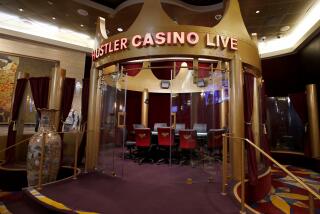Judge Urges That Bingo Game Lose License Over Pay : Charities: A city official will have the final say in the dispute. The president of Identity Inc. contends that she was a victim of a vendetta by former employees.
- Share via
Concluding that the city’s second largest charity bingo game illegally paid its workers, an administrative law judge Monday recommended revocation of its license to operate.
The findings capped reams of often bizarre testimony and months of legal squabbling between the Los Angeles Social Service Department and Edith Ryan, colorful president of Identity Inc., a Woodland Hills-based charity for disabled young people that grossed $3.3 million between January and November.
“It’s a total shock,” said the 64-year-old Ryan, widely known as the “Queen of Bingo,” who insists that she is the victim of a vendetta waged by former Identity workers. Four ex-workers testified at the administrative hearing that they were paid $100 to $300 a night by Ryan.
State law makes it a misdemeanor for bingo charities to pay their workers. City regulations also forbid it, and Los Angeles police are discussing the possibility of filing criminal charges with the city attorney’s office, a police spokesman said.
In his ruling, Administrative Law Judge David B. Shapiro said he found it compelling that the four ex-workers stepped forward to admit receiving pay for working at a charity bingo parlor.
During their testimony, the four were advised by city prosecutors that their receipt of such funds--and their admitted failure to report the money on their income taxes--could subject them to further liability.
Shapiro also dismissed as “unworthy of belief” the testimony of an ex-convict who said he was hired for $10,000 by Sylvia Dean, one of Ryan’s top associates and later her chief accuser, to terrorize Ryan and drive her out of town. The surprise witness, Gene Hawkins, said Dean wanted to take control of Identity.
Shapiro said he found the testimony “too good to be true,” especially in light of the fact that Hawkins, who spent eight years in prison for robbery and kidnaping, was receiving free lodging from Ryan.
The case against Identity was brought by Robert Burns, general manager of the Social Service Department, which regulates charities in the city.
In August, 1990, Burns notified Identity of his intent to revoke its license. Following city rules, he then gave Identity and his staff an opportunity to present their cases before the administrative law judge.
The findings and recommendations now go to Burns, who said he expects to issue his final decision in mid-January after giving Identity an opportunity to challenge the judge’s 39-page report.
Shapiro advised Burns to revoke Identity’s license or “impose whatever other penalty the general manager considers appropriate.”
Although disciplinary steps short of revocation are available, Burns said he rarely uses them, preferring to revoke the licenses of noncompliant bingo operators.
From January through November, Identity was the second highest grossing bingo game licensed by the city of Los Angeles. Surpassing it was a Van Nuys-based game operated by United Cerebral Palsy Spastic Children’s Foundation, which received $3.4 million in wagers.
However, the $390,225 listed as being used for charitable purposes by Identity was the most of any bingo operation during the 11 months, topping the $355,104 earned for United Cerebral Palsy.
Burns said Identity’s skill at funding charitable causes is not an issue that he will consider in weighing what disciplinary action to take.
“I can’t take that into account,” he said. “It’s not part of the charge. . . . Edith, of course, will want us to take this into account.”
Identity’s payments to charity may be misleading, Burns said. “These net numbers do not mean Identity is giving us the biggest charitable bang for the buck,” he said, declining to elaborate.
Ryan said her bingo operation is only now beginning to recover from the publicity over Burns’ charges. “We’re only getting 300 players a night,” Ryan said, noting that the games used to draw 350 players.
Because of the financial pinch, Identity has had to drop its contracts with a physical therapist and psychologist, the only professional staff it had for its 12 disabled clients, Ryan said.
The ban on paying workers is intended to keep charity bingo games from becoming professional operations and from diverting proceeds from charities.
More to Read
Sign up for Essential California
The most important California stories and recommendations in your inbox every morning.
You may occasionally receive promotional content from the Los Angeles Times.










